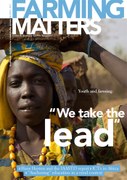Francisco Caporal argues against changes in the Brazilian Forest Code. Industrial agriculture is expanding in order to remain competitive, and this growth does not consider environmental concerns. But the biggest worry today is that many persons and organisations are pushing for changes in the existing legislation – especially those laws and regulations which have proved to be effective.
Although researchers and analysts are showing that deforestation rates have decreased sharply in recent years, we feel that the situation is not as good as the figures that they present would indicate.
First, because they focus on regions like the Amazon rainforest, paying less attention to other areas where the cultivation of soybeans or sugarcane, for example, is on the rise. Industrial agriculture is expanding in order to remain competitive, and this growth does not consider environmental concerns. But the biggest worry today is that many are pushing for changes in the existing legislation – especially those laws and regulations which have proved to be effective.
The Brazilian Forest Code has served as a model for legislation in many countries. Although it has undergone several modifications since it was signed in 1934, it is still seen as the pillar of the country’s environmental legislation, and has helped protect – even if not completely – the country’s tropical and sub-tropical forests. Over the past decade, however, the Brazilian agribusiness sector and their representatives in Congress have increasingly attacked the existing limits on deforestation, complaining about the possibilities of being penalised for “environmental crimes”. Their main argument is that the existing environmental legislation is holding back the development of the country’s agriculture sector.
A proposed new code was approved by a parliamentary commission in 2010, and Congress will debate its approval in the coming weeks. This proposal has already been criticised by researchers, farmers’ and civil society organisations – all of whom question the economic and political interests behind these proposed changes to the Forest Code, and the possible environmental and social impacts that may occur as a result of them. This new legislative proposal “forgives” all deforestation which occurred before 2008, releasing those who have destroyed the forests from any obligation to restore them. It also reduces the total number of Permanent Preservation Areas in the country. This will have serious consequences. On the one hand, it will eliminate any sense of responsibility or accountability. On the other hand, it is an invitation to deforesting new areas, something which will generate a new wave of environmental destruction, with immeasurable impacts.
It is clear that, once again, politicians and policy makers are forgetting that future generations will depend on the natural resources, biodiversity and environmental services provided by our forests. It is worth fighting so that nonsensical proposals such as this one are not approved.
Text: Francisco Roberto Caporal
Francisco Roberto Caporal lectures at the Federal Rural University of Pernambuco, Brazil. He is also President of the Brazilian Association of Agroecology.

